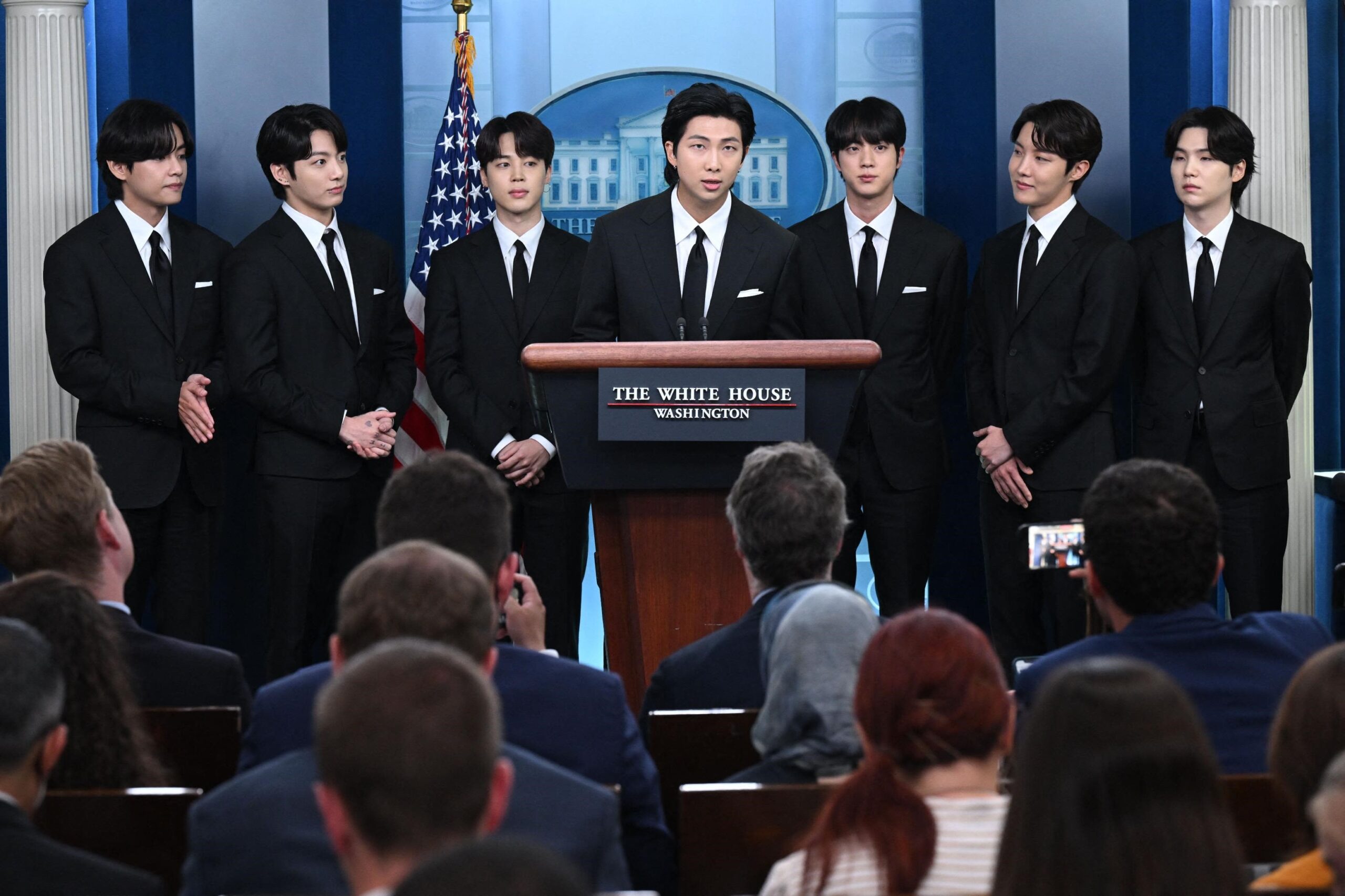By Vera Rondriguez,
Two girls are getting ready to greet Melania Trump. When they approach her, one of them almost faints with excitement, seemingly overwhelmed by emotion at the sight of the US First Lady. However, Melania soon realizes that the teenagers were not looking at her, but at the special envoy standing at her side, a member of the popular K-pop group, EXO. Another filmed scene: One of the members of Red Velvet, a girl K-pop group, is talking in an interview in Pyongyang. The group is visibly nervous as they describe their experience, after offering a concert for Kim Jong-Un. These moments are perhaps two of South Korea’s most striking examples of public diplomacy. Also, the second gave the internet one of the most iconic pictures of politics in the 21st century, showcased as the cover image for this article. All of these scenes are prime examples of the geopolitics of K-pop. Through a glimpse of this soft power tool, this article will show why K-pop so often teaches about the complicated political dynamics in East Asia.
The policy around this music genre reflects a calculated use of power through non-tangible means to gain a positive image, also called soft power. K-Pop demonstrates another way of thinking about power, departing from the traditional conceptualization, as power had always been military or economic strength. In 2005, Joseph Nye defined Soft Power as “the ability to shape the preferences of others” through attraction rather than coercion. Since then, soft power has been a frequent academic and political debate topic.
Middle states often must rely on softer tools to attain their objectives. South Korea’s specificities have limited the use of power through “harder” means (i.e., military). Some factors include Seoul’s conflict with Pyongyang, limited size, resources, and geographical location. Hence, the state relies on soft power to escape these natural and historical barriers, to become more prominent on the world stage, and to guarantee its protection. The export of culture is thus two-fold: obtaining a solid international presence while containing war. The close interdependence of economies is a deterrence from conflicts. Accordingly, it is not only music that the country utilizes to leverage its global presence.
From K-dramas to movies or skincare products, Seoul has crafted “Hallyu”, a boom in popularity of all things Korean. Some laws, such as 2016’s Law on Public Diplomacy or 2021’s Public Diplomacy Act, include explicit strategies to make Korean culture more accessible. The latter states the following: “Korea’s public diplomacy entails promoting diplomatic relations by sharing our country’s history, traditions, culture, arts, values, […]“. By doing so, they expect to “enhance (their) diplomatic relations and national image by gaining the trust of the international community and increasing our country’s global influence“.

K-pop is thus one more tool in this effort to showcase Korean culture. Through music, Seoul aims to enhance trust in the country globally and, most crucially, with its neighbors. The multi-national (East-Asian) composition of K-pop groups also allows South Korea to establish friendly ties with other regional states. However, it is an equally double-edged sword. For instance, the singer Tzu-yu, part of the group Twice, appeared waving a Taiwanese flag on a South Korean television show. Chinese Internet users demanded that she and her band, Twice, be banned from performing in China. The netizen’s blunt response follows the One China policy, which is significantly strict with Xi Jinping’s mandate. This policy understands the island as a part of mainland China and thus includes a series of informal and formal coercion tactics that make the island more dependent on Beijing. To address the controversy, the singer recorded a video stating, “There is only one China […] The two sides of the strait are one, and I have always felt proud to be Chinese“.
Furthermore, although the country uses soft means to maintain good relationships with its neighbors, this strategy is imperfect. China has started to develop a robust cultural industry and does not shy away from banning Seoul’s products. Beijing unofficially banned South Korean cultural content, including K-dramas, K-pop, and beauty derivatives. This ban followed the installation of Terminal High Altitude Area Defense (THAAD) missiles on an American military base, in South Korea, in 2017. Even after lifting its veto on the Korean Wave, this period has crafted a national market uninterested in Seoul’s offers.
Despite the difficulties mentioned, K-pop has allowed South Korea to be at the epicenter of discussions. The popularity of K-pop and other “Hallyu” products has blended into politics. In 2018, the group BTS spoke at the United Nations as representatives of the Love Myself campaign, an initiative dedicated to combatting child violence. In 2020, they reiterated their message, this time through virtual means. Many of the South Korean band’s followers actively engaged with the cause, contributing to what may be one of UNICEF’s most internationally recognized campaigns in recent years. In 2022, the band went to the United States to the White House to raise awareness about Asian hate crimes.

This music genre continues to involve its fans in current political discourse while teaching about the history of different Asian states. One might say that a passion for K-pop can serve as an informational gateway to understanding Asian political dynamics. As showcased in this article, this music genre is an opportunity for South Korea to repair unhealed wounds between East Asian countries, but it has some drawbacks. What is certain is that Seoul has achieved the ability to capture the attention of both Eastern and Western audiences alike. This exercise of public diplomacy also makes politicians more inclined to make deals with them and see them as a more attractive country to have as an ally. Although South Korea’s importance stems also from its economic potential, the cultural blooming of the country has undoubtedly helped Seoul to leverage its image internationally.
References
- Domestic and Global Political Impacts of K-Pop: BoA, BTS, and Beyond. CNAS. Available here
- Singer’s Apology for Waving Taiwan Flag Stirs Backlash of Its Own. The New York Times. Available here
- K-pop’s return to China: A battle for relevance. Jing Daily. Available here
- Geun Lee. “A theory of soft power and Korea’s soft power strategy”. Korean Journal of Defense Analysis. V (21) 2. p. 205-218. Available here




